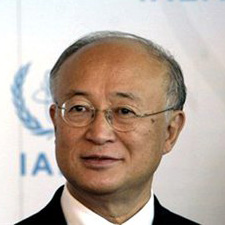Iran and the U.N. nuclear agency said on Friday a deal on uranium enrichment was still possible, but Iran said it wanted changes to the draft accord meant to allay Western fears over its nuclear program, Reuters reported.
Western diplomats have said Iran has effectively turned down the proposal and the United States and major European allies are pursuing broader U.N. sanctions against the Islamic Republic over its disputed nuclear activity.
Iranian Foreign Minister Manouchehr Mottaki told Reuters the proposal, which would involve Iran sending its low enriched uranium abroad in exchange for more highly enriched fuel to produce medical isotopes, "still can be on the table."
He was speaking at the World Economic Forum in Davos, shortly after Yukiya Amano, head of the International Atomic Energy Agency which brokered the draft deal on enriched uranium, told reporters in the Swiss ski resort that the offer remained.
"The proposal is on the table. Dialogue is continuing," Amano said in his first public remarks on the standoff since he succeeded Mohamed ElBaradei two months ago.
He left unclear whether "dialogue" meant the IAEA was actively exploring compromises with Iran and world powers. Western officials have stopped short of declaring the plan dead but said Tehran's approach had not been serious.
Mottaki said the deal offered to Iran would require it to wait several months after handing over its low enriched uranium before it received the more highly enriched material.
"The point is this exchange should be simultaneous," he said. "The ... technical point which the other side raised is it takes time -- three months, five months, six months to prepare 20 percent enriched uranium," he said.
"We said: ...When it is ready then simultaneously we will exchange it'."
LACK OF TRUST
Western countries had hoped the draft deal, which saw Iran sending 70 percent of its low-enriched uranium abroad in return for special fuel for its nuclear medicine reactor, would prevent Tehran acquiring enough material to build an atom bomb.
Iran says its nuclear program is peaceful, but Amano said 20 years of undeclared Iranian nuclear work had undermined international trust.
IAEA inspection work in Iran is restricted and Amano said the agency was struggling to maintain oversight.
"Comprehensive safeguards should be fully implemented. That is what we are struggling (with) now," he told a panel on nuclear proliferation in Davos.
"I hope agreement will be reached (on the fuel plan) and I continue to work as intermediary. This will ... help increase confidence," Amano said.
Brazil's Foreign Minister Celso Amorim said he had held talks in Davos with Mottaki and Western officials in an effort to restart dialogue over the nuclear dispute.
Russia and China have also called for more negotiations, opposing further sanctions which they believe may hinder a peaceful solution. Neither sees Iran as an imminent nuclear threat, though Moscow on Friday showed signs of impatience.
Secretary of State Hillary Clinton said the United States was trying to persuade Beijing to get tough with Iran.
"As we move away from the engagement track, which has not produced the results that some had hoped for, and move forward (on) the pressure and sanctions track, China will be under a lot of pressure to recognize the destabilizing impact that a nuclear-armed Iran would have in the Gulf, from which they receive a significant percentage of their oil supplies," she said during a visit to Paris.
Under the draft plan, Tehran would transfer 70 percent of its low-enriched uranium (LEU) to Russia for further processing and then to France for conversion into special fuel rods to keep a Tehran nuclear medicine reactor running.
Western negotiators said Iran accepted the scheme in principle at Geneva talks with six world powers in October, only to back off after ElBaradei fleshed out details.
In a sign of growing frustration, Russia's foreign ministry warned that Tehran's plans could obstruct a deal.
"The decision to start its own uranium enrichment, which runs counter to the requirements of relevant resolutions of both the U.N. Security Council and the IAEA Board of Governors, will only fan the existing concerns and obstruct the early settlement of the situation," spokesman Andrei Nesterenko said.






